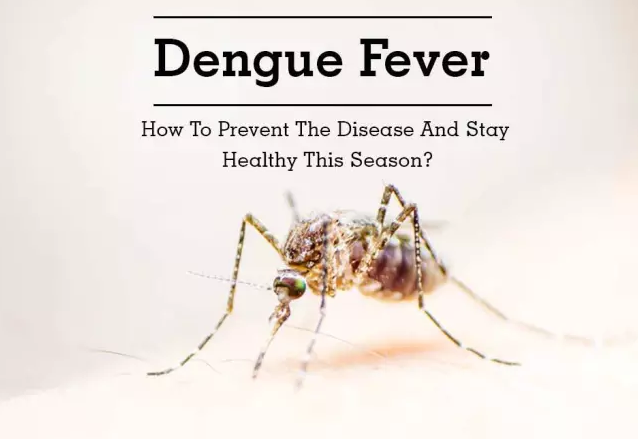Dengue is a mosquito-borne viral infection caused by dengue flavivirus. It is a significant vector-borne disease and has become a global problem causing epidemics in many countries. It is the most common arthropod-borne viral disease. Outbreaks may occur in the monsoon season as breeding of the Aedes aegyti is rampant.
What are the symptoms?
Dengue presents with various symptoms such as high-grade fever, headache, nausea, vomiting, rash, muscle and joint aches. More severe cases may present with bleeding disorders and low blood pressure.
Cause of illness
The causative agent is the dengue virus which lives within the mosquito and does not cause any harm to the mosquito. The mosquito becomes infective after feeding on a dengue patient. Once this happens, the mosquito remains infected for life. The Aedes aegypti prefers to live close to the humans and to feed on humans than other vertebrates.
Dengue is spread by various species of the Aedes mosquito, mainly Aedes aegypti. The dengue virus has four types of multiple infections. One of these types gives lifelong immunity. The rest of the types give only short-term immunity, and reinfection can occur.
What needs to be done?
If you develop any of the symptoms, it is better to visit your healthcare provider at the earliest.
Tests to be done
Blood will be checked for complete blood count, detecting antibodies to the virus dengue antigen and other tests as deemed necessary by the treating physician.
Types of dengue fever
- Classical Dengue Fever: This is also called break-bone fever. After exposure of 7 -10 days, illness presents with fever, headache and other minor symptoms, this is the mild variety. The characteristic skin rash is an important diagnostic and clinical marker of the disease. This is usually a self-limiting disease, and most of the dengue cases fall into this category.
- Dengue hemorrhagic fever: It can be caused by infection with more than one dengue virus. It is a severe form and more dangerous, gastrointestinal bleeds, bleeding from the nose, fluid buildup in the lungs and abdomen and suffering in the skin. The acute infection is thought to be due to the combination of diseases. The first infection which will sensitize the patient and the second infection will produce the immunological complications which lead to plasma leakage and abnormal hemostasis which can present as a rising hematocrit value( increase by 20% or more compared to the baseline value) and low platelet counts.
- Dengue shock syndrome: Abdominal pain with vomiting, bleeding, conjunctival congestion and inflammation of the liver. Blood pressure can be dangerously low and there is a high probability to develop disseminated intravascular clotting which can lead to severe bleeding disorders.
Treatment:
No specific treatment of dengue is available. Symptomatic and supportive -fluids both oral and intravenous can be used, paracetamol and mefenamic acid are used to control the febrile spikes. Ensure that early institution of treatment is done. Treatment of complaints like nausea, vomiting, loose motions, etc. should be addressed too. Fluid replacement should be adequate to compensate for the leakage and to maintain an effective circulation. However fluid overload should be avoided by ensuring that excessive replacement is not done, as this can lead to respiratory distress. Bed rest is mandatory. Aspirin and drugs like brufen and diclofenac should be avoided as these could aggravate gastritis and cause bleeding too. The platelet count will be monitored daily till they show an upward trend; the coagulation profile will also be closely monitored. As long as the platelet count is stable, clinically all vitals are stable these cases can be managed as outpatients. However, if the platelet counts start falling hospitalization may be needed. Hospitalization is required to replenish the platelets as well as treat the complications (if any). If dengue hemorrhagic fever and dengue shock syndrome develop the patients will have to be shifted to the Intensive care unit for continuous monitoring and cardiac and respiratory support. Elderly patients, very young and those with concomitant illnesses like Diabetes and Ischemic heart disease should be monitored very carefully and admitted to the hospital if any doubt arises.
Outcome:
Most cases will recover without any untoward incidents, but severe cases may result in mortality. Children usually have a milder attack compared to adults.
Prevention and Future:
Eliminating the mosquito would be ideal. Vaccines are being developed and are being tested for commercial use in a few countries. Drugs which can attack the virus are being studied. Prevention is the key for the time being. The most important attribute is vigilant control of the surrounding; eliminate open water containers and spraying to prevent multiplication of the mosquitoes in their habitat. Personal protective measures of limiting exposure to mosquito bites by wearing fully covered clothing are helpful and can prevent the disease. Other measures like bed nets, mosquito repellent creams are useful to some extent. A new breed of safe mosquitoes which will feed on the Aedes aegptyi is also possible in the near future.
Take Home Message: Generally speaking, Dengue can be diagnosed and treated adequately if the patient reports early. This can prevent complications, hospitalization, and mortality. A delay can be very dangerous and catastrophic.
So do please meet your health care provider whenever you are not too sure about your febrile illness.
Dietary modifications
- It is important to follow a diet which is easy to digest, high in calorie and protein. Include meals at short intervals to gradually increase the calorie intake of the day and prevent nausea.
- Soft foods are easy to digest so include foods that are mashed or slightly overcooked.
- Avoid milk as it is tough to digest and is likely to aggravate diarrhea.
- Add juices, steam fruits, homemade vegetable soups with no additional spices.
- Avoid high fiber foods like whole grains and raw vegetables as these can place additional stress on your digestive system.
- Avoid vegetables like cabbage, capsicum and turnip as these can cause bloating and gas.
- Avoid butter, ghee, vanaspati, dalda, vegetable oil, chillies and all spices especially hot seasonings such as pepper, Cayenne and chili powder. Avoid preparations like rasam, sambaar etc.
- Red meat is tough to digest and can aggravate diarrhea, gas, and other such digestive problems hence should be avoided. However, in some cases, only steamed and finely shredded chicken can be added to a soup to increase the patient’s protein intake.
- Boiled or poached egg can be added to the diet if there is no bloating or gas.
- Restrict your caffeine intake to 100-200ml per day.
Fluid Intake
- The profuse sweating results in a drastic loss of fluids, vitamins, and electrolytes such as sodium and potassium. Drink at least 2-3 liters of water every day.
- Fluids in the form of tender coconut water, barley water, electrolyte fortified water, fresh fruit juice, vegetable soup, buttermilk, lime juice, glucose water, honey water and sugarcane juice should be consumed until body temperature comes back to normal.
Home remedies
- Add four to five cloves to water and bring it to boil. Continue boiling until the solution reduces to half its original quantity. Filter and drink this twice daily for a week.
- Blend 4-5 mint leaves in half cup coconut water. Drink 2-3 tbsp of this twice daily for a week.
- Take 5-6 basil leaves, 1 tsp of crushed ginger and add 1 cup of water to this. Boil this and add honey to it. Drink 50ml of this twice daily for a week.
- Add few drops of honey to half teaspoon of apple cider vinegar. Drink this before every meal.
Preparations those are easy to make
- Slightly overcooked rice with yogurt: Rice contains small amount of fiber that helps to regulate the digestive system while yogurt contains healthy cultures that reduce the severity of stomach flu.
- Baked potato, soft-boiled or poached eggs with rice
- Moong daal khichdi/pongal made only with turmeric and salt.
- Mashed sweet potato/mashed carrot with rice
- Mashed banana with honey
- Tofu (not paneer)
- Sattu mixed with buttermilk
- Steamed idli/dosa with sugar or curd
- Roasted suji/rava kanji
General Instructions
- Wash raw fruits and vegetables with warm water before eating.
- Wash your hands well before you eat.
- Avoid buying food from street vendors.
- Drink boiled or purified water only.
Post dengu Care
- Your post dengu diet should include high protein and low fiber which is easy to digest
- Keep snacking regularly throughout the day (after every 2-3 hours).
- Add whole grains like wheat, jowar, bajra etc that are digested more slowly, keeping your blood sugar and energy levels stable.
- Add green leafy vegetables and fruits to your diet as they are rich in antioxidants.
- Chappati and rice with various dals, legumes, soya beans (chunks/ granules/ tofu/ whole), chicken, fish and eggs.
- Consume lot of of milk and milk products everyday like a glass of milk/ buttermilk/ lassi, curd or paneer.
- Consume almonds, walnut, roasted chana and groundnut.
- Keep drinking lot of water to keep your body hydrated all the time.
About The Author
Dr. Belliappa– MBBS, MD, Aerospace Medicine, DIH, FCGP, PGDHA
Ms. Ratika Vinchurkar– MSc, Food & Nutrition, RxDx.
For booking, appointment call us today!!!
If you have further questions then please contact us on.




